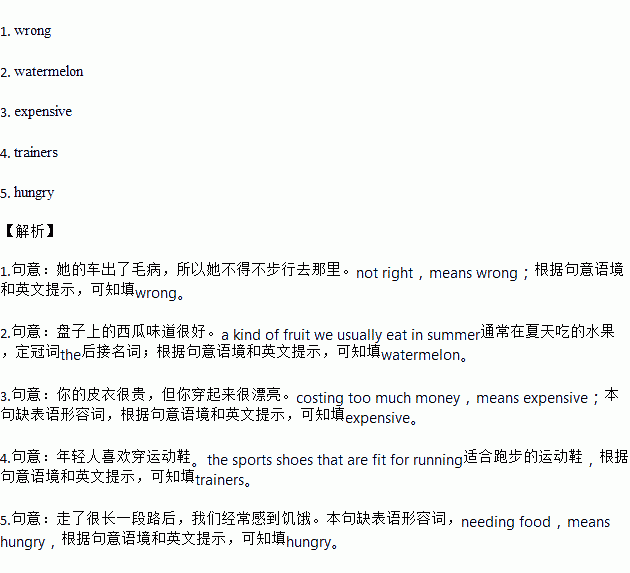题目内容
根据句意和英文解释提示,在空白处填入一个适当的单词。(每空一词)
1.There was something _______________ (not right) with her car, so she had to walk there.
2.The _______________ (a kind of fruit we usually eat in summer ) on the plate tastes nice.
3.Your leather coat is _______________ (costing too much money) , but you look smart in it.
4.Young people like wearing _______________ (the sports shoes that are fit for running) .
5.We are often ______________ (needing food) after a long walk.
 1. wrong
2. watermelon
3. expensive
4. trainers
5. hungry
【解析】
1.句意:她的车出了毛病,所以她不得不步行去那里。not right,means wrong;根据句意语境和英文提示,可知填wrong。
2.句意:盘子上的西瓜味道很好。a kind of fruit we usually eat ...
1. wrong
2. watermelon
3. expensive
4. trainers
5. hungry
【解析】
1.句意:她的车出了毛病,所以她不得不步行去那里。not right,means wrong;根据句意语境和英文提示,可知填wrong。
2.句意:盘子上的西瓜味道很好。a kind of fruit we usually eat ...
William Shakespeare ______ for four centuries, but his works are still famous today.
A. has been dead B. has died C. died D. was dead
 A
【解析】
句意:威廉·莎士比亚已经去世四个世纪了,但他的作品至今仍很有名。考查动词时态辨析题。for four centuries四个世纪,是一段持续的时间,用于现在完成时,可排除CD两项。die死亡,非延续性动词,不可和一段时间连用,可排除B。dead死的,表状态;根据句意语境,可知选A。
A
【解析】
句意:威廉·莎士比亚已经去世四个世纪了,但他的作品至今仍很有名。考查动词时态辨析题。for four centuries四个世纪,是一段持续的时间,用于现在完成时,可排除CD两项。die死亡,非延续性动词,不可和一段时间连用,可排除B。dead死的,表状态;根据句意语境,可知选A。 —_____was Jane’s trip?
—It was terrible.
A. How B. What C. Where
 A
【解析】
句意:——简的旅行怎么样?——非常糟糕。How如何,对方式或状况提问;what什么,对事物提问;where哪里,对地点提问。根据It was terrible可知此处对状况提问,故用疑问词how,故选A。
A
【解析】
句意:——简的旅行怎么样?——非常糟糕。How如何,对方式或状况提问;what什么,对事物提问;where哪里,对地点提问。根据It was terrible可知此处对状况提问,故用疑问词how,故选A。 Mr. Smith asked us some flowers in the garden last week.
A. to grow B. grow C. grew
 A
【解析】
句意:上周史密斯先生要求我们在花园里种一些花。ask sb to do sth要求某人做某事,故为to grow,故选A。
A
【解析】
句意:上周史密斯先生要求我们在花园里种一些花。ask sb to do sth要求某人做某事,故为to grow,故选A。 完形填空 (5分)
Jim Green is an announcer (播音员)for the program (节目). Most of the girls____boys like the program. They____like Jim Green. Some of them often make phone calls to him and thank him
____his work, there are lots of____to him every day, too.
Jim Green gets up at 6:00 every morning. He has bread and a glass of milk____breakfast. He leaves home at 6:30 and_____his office at 7:15. The program____at 7:30.He plays the new records (唱片) of the pop songs and modern music for his listeners. At 8:00 it's time____the news. Jim finishes work at 10:30. He goes home____his car. He____newspaper and listens to music after supper. He thinks his life is very interesting.
1.A. and B. with C. but D. about
2.A. too B. to C. also D. so
3.A. to B. for C. of D. and
4.A. letter B. letters C. friends D. words
5.A. at B. with C. for D. to
6.A. goes B. gets C. gets to D. gets up
7.A. begins B. finishes C. over D. start
8.A. to B. for C. of D. in
9.A. by B. in C. on D. takes
10.A. looks B. reads C. sees D. watches
 1.A
2.C
3.B
4.B
5.C
6.C
7.A
8.B
9.B
10.B
【解析】
试题这篇短文讲述的是一个节目播音员Jim Green的生活,他的节目非常受青少年们的欢迎。他的生活也很有趣,他每天6点起床,6点半离开家去上班。他10点半下班。晚饭后他经常读报纸和听音乐。
1.
2.
3.
4.
...
1.A
2.C
3.B
4.B
5.C
6.C
7.A
8.B
9.B
10.B
【解析】
试题这篇短文讲述的是一个节目播音员Jim Green的生活,他的节目非常受青少年们的欢迎。他的生活也很有趣,他每天6点起床,6点半离开家去上班。他10点半下班。晚饭后他经常读报纸和听音乐。
1.
2.
3.
4.
... (题文)There are months in a year. December is in the month.
A. twelve; twelve B. twelfth; twelfth C. twelfth; twelve D. twelve; twelfth
 D
【解析】
句意:一年有12个月。十二月是第十二个月。考查数词辨析题。前句months月,复数名词需用基数词修饰,可排除BC两项;后句定冠词the修饰序数词,可排除A项。根据句意语境,可知选D。
D
【解析】
句意:一年有12个月。十二月是第十二个月。考查数词辨析题。前句months月,复数名词需用基数词修饰,可排除BC两项;后句定冠词the修饰序数词,可排除A项。根据句意语境,可知选D。 Don’t go out _____ the rain stops. Otherwise, you’ll get wet.
A. after B. since C. when D. until
 D
【解析】试题句意:直到雨停再出去,否则你会被淋湿的。after在……之后;since自从;when当……时候;until直到…时候。这句话中使用的句型是not…until…,直到……时候才……。其他选项不符合句意,故选D。
D
【解析】试题句意:直到雨停再出去,否则你会被淋湿的。after在……之后;since自从;when当……时候;until直到…时候。这句话中使用的句型是not…until…,直到……时候才……。其他选项不符合句意,故选D。 We are not sure when the rain ________. When the rain ________, we will go on working.
A. will stop, stops B. stops, will stop C. will stop, will stop D. stops, stops
 A
【解析】句意:我们不能肯定雨什么时候会停。当雨停的时候,我们将继续工作。考查时态。第一句是when引导的宾语从句,主句是一般现在时,从句“什么时候雨将会停”表示的是将来的意思就用一般将来时;第二句为when引导的时间状语从句,要遵循主将从现的原则,即主句用一般将来时,从句要用一般现在时代替一般将来时,主语是rain“雨”,不可数名词,所以stop要加s;结合选项可知A选项符合题意,故答案...
A
【解析】句意:我们不能肯定雨什么时候会停。当雨停的时候,我们将继续工作。考查时态。第一句是when引导的宾语从句,主句是一般现在时,从句“什么时候雨将会停”表示的是将来的意思就用一般将来时;第二句为when引导的时间状语从句,要遵循主将从现的原则,即主句用一般将来时,从句要用一般现在时代替一般将来时,主语是rain“雨”,不可数名词,所以stop要加s;结合选项可知A选项符合题意,故答案... 
